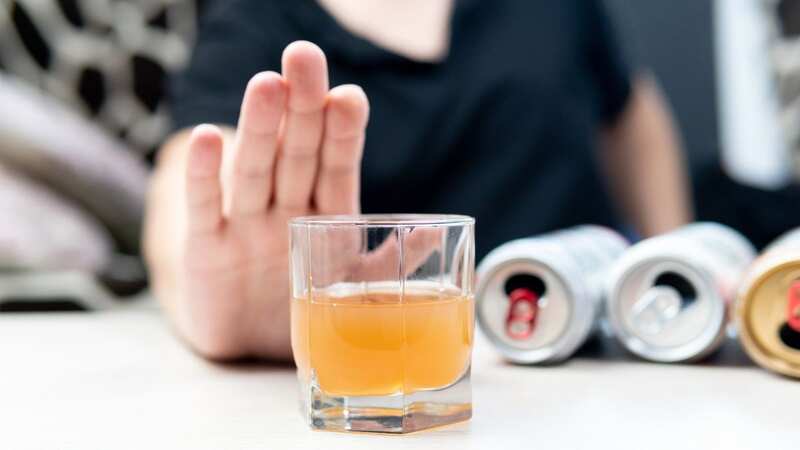Eight signs your liver could do with break from alcohol - even after Dry January

Many Brits are taking part in Dry January, waiting until February comes around to sip their favourite booze again.
Some may abstain from alcohol altogether while others are rethinking their approach to alcohol consumption going forward, as long-term abuse of alcohol can have serious consequences. But, do we really know what the dangers of drinking means for our health in general?
Our liver performs over 500 jobs and is a vital organ. It works as the human body's processing, storing and distribution factory.
The liver detoxifies all the poisonous chemicals we consume - such as alcohol, drugs and pollutants- and stores vitamins, fats, sugars and minerals until the body needs them. The organ produces bile, which breaks down fats, so they can be absorbed by the body and helps us fight infections - super important at this time of year.
So, it is fair to say that every other important bodily system relies on a well-functioning liver and looking after it is vital.
 'I stopped drinking booze on dates and it made life much more exciting'
'I stopped drinking booze on dates and it made life much more exciting'
The British Liver Trust reports that around 4,000 people in the UK die from liver cirrhosis and 700 people have to have a liver transplant each year to survive. The Liver Trust says 90 per cent of disease cases can be prevented by staying a healthy weight, drinking less alcohol and treating and preventing hepatitis The good news is, though, 90% of liver diseases can be prevented with simple lifestyle changes.
What are the two main types of liver disease?
The first type is alcohol-related liver disease – this accounts for 60% of all cases. Excessive alcohol consumption can leave the liver inflamed and swollen. This swelling can lead to scarring, which is what cirrhosis is.
Then there's non-alcohol related fatty liver disease – 1 in 3 people in the UK have the early stages of this disease, often caused by obesity.
How to identify if your liver needs some extra care
Nutritionist Libby Lemon, who works for Pukka Herbs, says to watch out for these symptoms, which could indicate early stages of liver disease.
Signs include:
1. Dark circles under the eyes that are not genetic
2. Dark urine
3. Fatigue
4. Bruising easily
5. Soreness swelling under your right lower rib cage, where the liver sits
 Heroic bystanders chase off attacker who dragged teen through alley to rape her
Heroic bystanders chase off attacker who dragged teen through alley to rape her
6. Swelling in legs and ankles
7. Skin conditions, like adult acne or itchiness
8. White or greasy, smelly stools
It's not too late...
It is not too late to reserve liver damage; the liver is exceptional at healing and regenerating itself, so here's how you can give it some love.
Even in these desperate times, stick to the guidelines of 14 units a week for women and men. This is the equivalent of 6 pints of average-strength beer (4% ABV) or medium-sized glasses of wine (175ml, 12% ABV) a week. And have a minimum of two alcohol-free days in a row.
If wine o'clock is getting earlier and earlier in your house because you're out of your normal routine, try to wait until after 8pm to have a drink, so there is less temptation to finish the bottle!
You could also get creative and make a virgin cocktail, or have a non-alcoholic beer or G&T – at least that way it still feels like you're having a treat. "Alcohol is a toxin the liver needs to detoxify," says Dr Shireen Kassam, consultant haematologist and certified lifestyle medicine physician.
Dr Shireen said what you eat can also affect the liver - saturated fat and sugar can lead to a build-up of fat inside and around the liver cells and impair their function. He advises to cut back on red and processed meat, processed/packaged foods, white bread and other white flour products, sugar-sweetened beverages and foods with lots of added salt.
You should also increase your intake of fruit, vegetables (especially green leafy veg), whole grains, beans, herbs and spices such as turmeric. 'The more colourful your food the better,' says Libby, 'because these provide antioxidants to help the liver with the detoxifying process.'
Make the most of that one trip out of the house and go for a long walk, run or bike ride. Exercise decreases stress on the liver, increases energy levels, and helps to prevent obesity – a leading cause of liver disease. There has been a surge of online fitness classes to join in the last few weeks, so if you are self-isolating and not leaving the house, sign up to one of those.
The body does most of its processing at night, and that includes the liver too. It's tempting to stay up and binge-watch Netflix at the moment, but stick to a routine, aiming to go to bed between 10pm and 11pm, and wake up between 6am and 7am, so that the liver can perform its necessary cleansing and resting functions.
Just like alcohol, most medications have to be processed by the liver. "Medications require a healthy liver for their action in the body," explains Dr Shireen Kassam.
He added: "Commonly prescribed pills that can affect the liver include paracetamol, statins, antibiotics, oral contraceptive pill and antidepressants." It is important to never exceed the stated dose of your medications and support your liver health with a healthy diet.
Do you have a story? Get in touch via [email protected].
Read more similar news:
Comments:
comments powered by Disqus

































